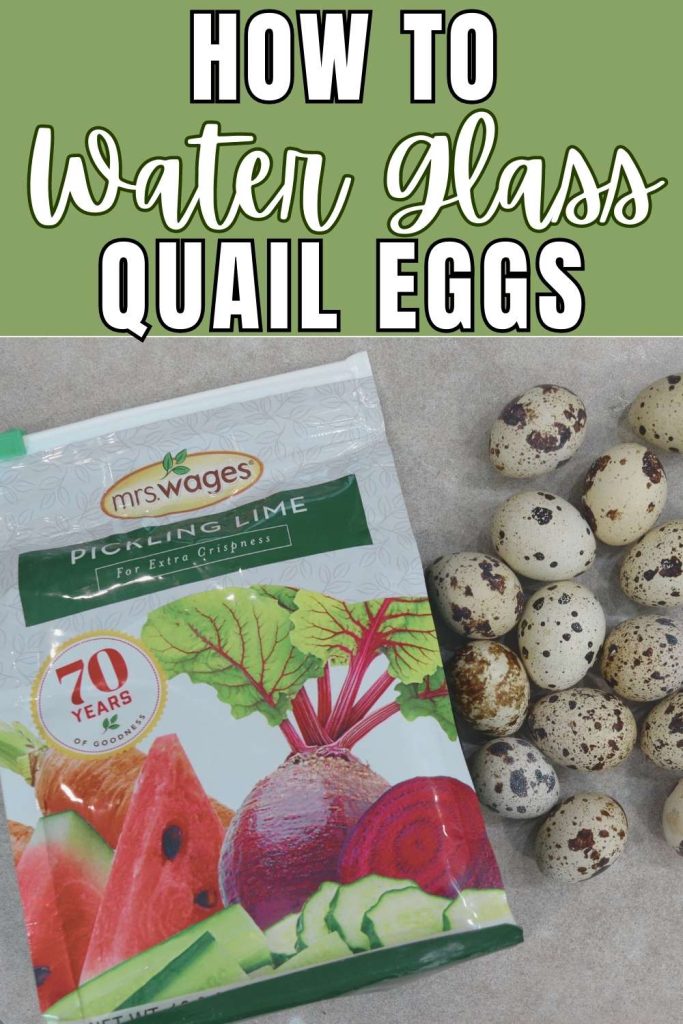Water Glassing Quail Eggs for Long-Term Storage
Water glassing is an excellent way to preserve your fresh quail eggs long term. Learn all about when and how to do it in this post.
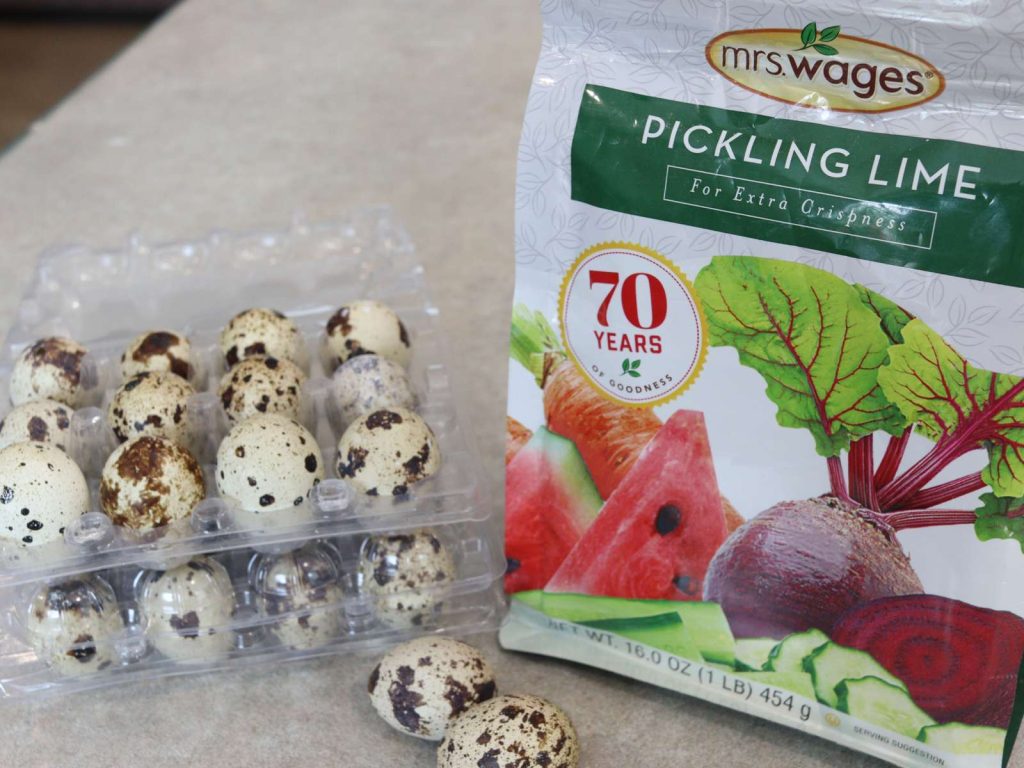
During the Spring and Summer months, your quail are probably laying tons of small, delicious eggs.
But did you know that during the winter months when daylight hours drop, your egg production will slow down?
That’s because egg laying is a seasonal process that is stimulated by the amount of sunlight that a bird receives.
But don’t panic!
You can easily preserve your extra eggs so that you have fresh eggs all winter long by water glassing!
Affiliate Disclosure: This post may contain affiliate links. As an Amazon Associate, this means that I will earn a small commission if you choose to purchase through my links. This is at no extra cost to you!
What is Water-Glassing Eggs?
Water glassing is an old method of egg preservation method that dates back to at least the 1800’s.
The process is simple. You mix pickling lime with water to create a solution. Clean, fresh eggs are then submerged in the liquid.
The lime water solution fills the pores of the bloom over the eggs, creating a sealed shell and allows your eggs to be shelf stable for 8 months to a year!
Some individuals report longer lifespans (up to 2 years!), however we’ve always need to use ours within the 8 month time period.
We love using different methods for egg preservation – and pickled egg recipes are at the top of our list!
What Eggs Can I Water Glass?
You need to use unblemished, unwashed eggs for water glassing. Eggs should be fresh, preferably only 24 hours old. They should also be free from any debris, so make sure you keep those nesting boxes nice and clean since these eggs cannot be washed.
As far as egg variety goes, you can use this method for chicken eggs, duck eggs, and quail eggs.
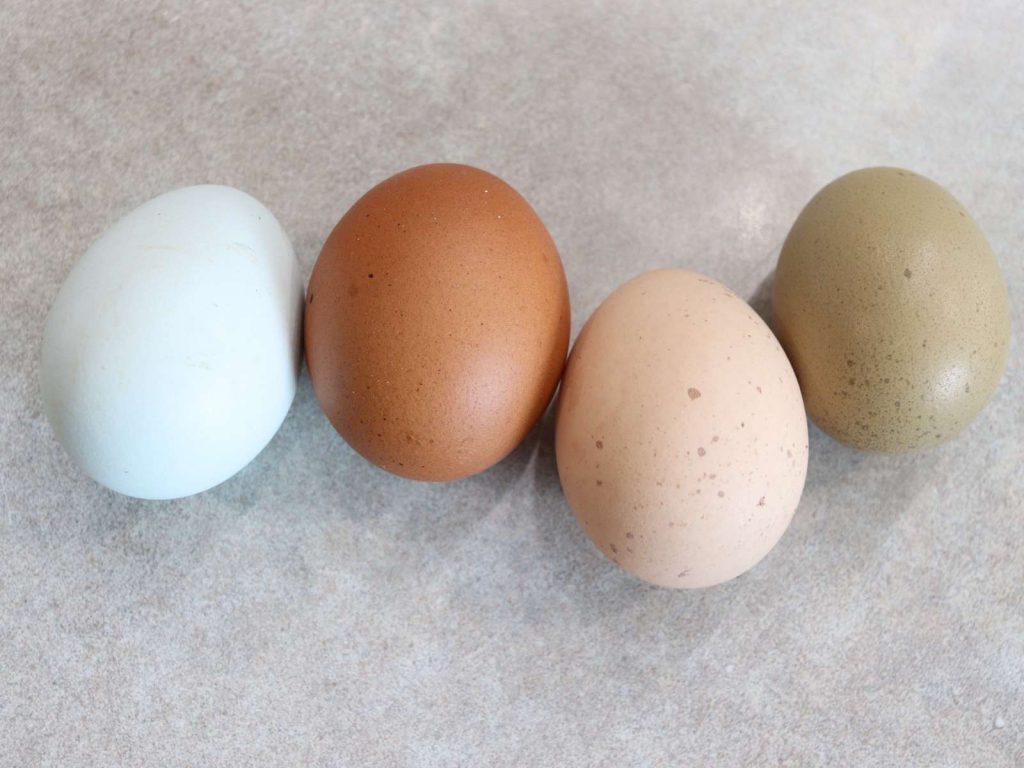
What You Need to Water Glass Quail Eggs
Food-Grade Buckets or Glass Jars with Lids– For water glassing small quail eggs, you will more than likely want to stick to a quart sized, half gallon, or gallon sized jar. You can get a lot of quail eggs in a containers this size. I recommend sticking to wide mouth jars for easier access.
Larger eggs, like chicken or duck eggs, do well in a food grade 5 gallon bucket. Or, if you only plan to preserve a small number of eggs, you can use gallon glass jars for these eggs as well.
Room Temperature Water – You want to use water that is chlorine and fluoride-free. If you’re on city water, you should not use your tap water. You will want to make sure your water is filtered, or you can pick up distilled water at the store.
Kitchen Scale – Water glassing eggs requires that you weigh out your pickling lime, so you will need a kitchen scale to get the ratios right.
Hydrated Lime – This is often known as pickling lime. You can purchase this online (be sure you are getting the food safe lime and not garden lime) or in the canning aisles of your grocery store. The ingredient list should show “Calcium Hydroxide”. I use this bag of Mrs. Wages pickling lime.

How to Water Glass Quail Eggs
Step One:
Start by mixing your filtered water and pickling lime, using a ratio of 1 quart of water to 1 ounce of lime.
You will need to use a kitchen scale to weigh the lime. Mix the solution until the lime is dissolved.
The amount of water you need will depend on the size of your container. You need to factor in that once the eggs are added, the water line will rise. So don’t fill your glass jar to max capacity with water – but do fill it enough that your eggs will be covered by about 2 inches.
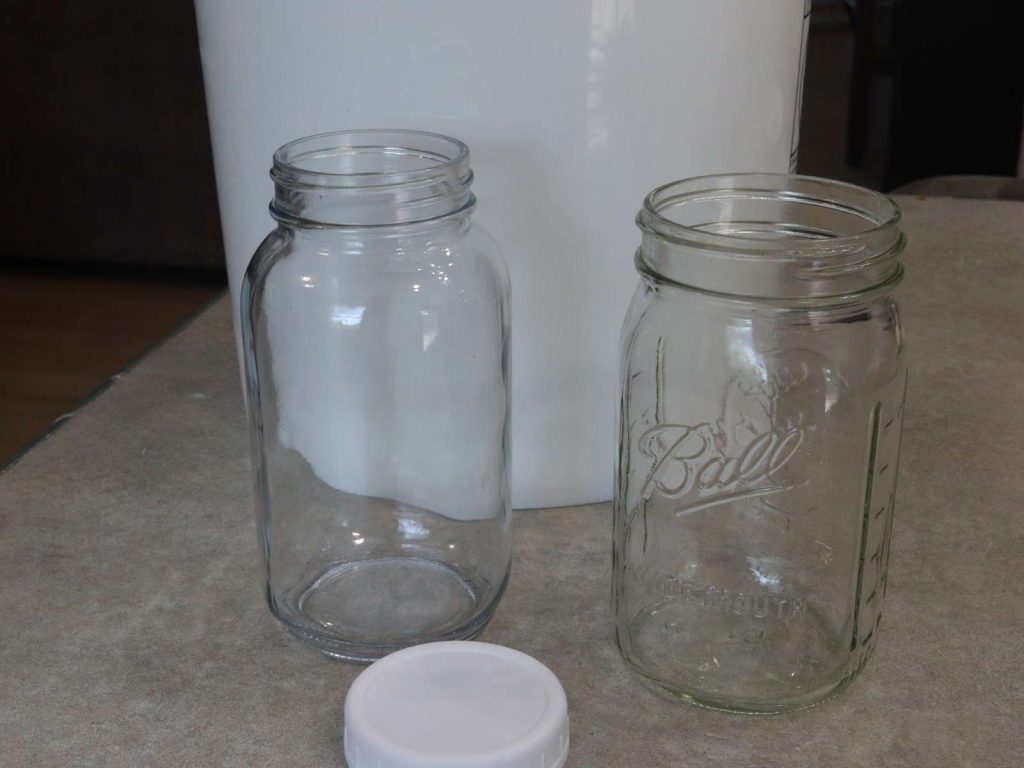
(You may want to wear gloves while handling the pickling lime as it can be irritating to skin.)
Step Two:
Start adding your clean eggs to the pickling lime solution. Do this gently to avoid any eggs cracking. If you crack an egg in the solution – you’ll need to start over.
Try to layer the eggs with the point side pointing down. Be sure not to force an egg in between others because you will surely end up with cracking.
Step Three:
Place the lid on your jar (or bucket) and move to a cool, dark place.
Make sure the area isn’t a high traffic area where your container will be continuously bumped. This just helps prevent eggs from being cracked during long-term storage.
Using Eggs that Have Been Water Glassed
When the time comes to use your water-glassed eggs, all you need to do is remove the eggs you need from the bucket and wash them thoroughly. You want to be sure to remove all of the lime solution before cracking your eggs.
And that’s it! Once the eggs are washed, they are ready to use.
Be sure to check out the other quail related posts on this blog! Like how to easily peel boiled quail eggs or the beginners guide to raising backyard quail!
How do I cook water glass eggs?
You can use water glassed eggs just like you would any fresh eggs. After thoroughly washed the egg shell to remove any of the lime solution, you can boil, fry, or use for baking.
If you are choosing to boil your water glassed eggs, you should first poke a small pinhole in the eggs to allow the shell to “breathe”.
This is because the lime solution fills all of the pores that the eggshell naturally has. If you don’t poke a small hole, you will likely end up with a lot of exploded eggshells while boiling.
My thanksgiving deviled eggs can attest to this.
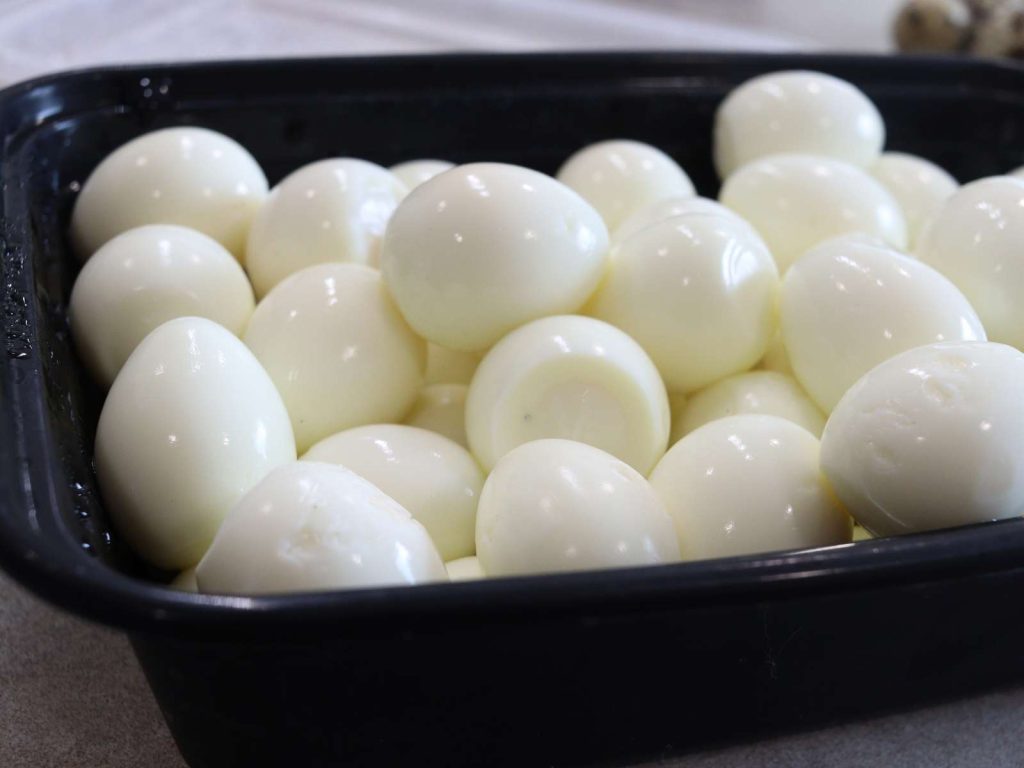
More FAQ’s
Where Should I store Water Glassed Eggs?
Store your closed container in a cool place that isn’t going to receive much movement. If the egg container is bumped into a lot, you are more likely to have a cracked egg that can spoil your entire batch!
Can I water glass store-bought eggs?
No, storebought eggs should not be used in the water glassing method. This is because store bought eggs have been washed, removing the protective bloom from the shell.
Should lime settle on the bottom of my water glassed egg container?
Yes, this is a typical part of the water glassing process.
How do I know if my water glassed eggs are bad?
When removing eggs from the water glassing container to use, be sure to inspect the shell for any cracks. If a shell has been cracked, throw it out.
You should also crack your washed eggs individually, in a separate bowl, before incorporating in your recipe. This allows you to inspect each egg for an odd color or bad smell, which are signs of a spoiled egg.
Can I water glass fertilized eggs?
Yes, we water glass our fertilized eggs with no issues.

What should I do if my eggs crack during water glassing?
This depends on how long the broken egg has been there.
The first step is to remove the cracked egg(s) and remix your water glass solution in a clean container.
Over the next several days, pay attention to the new lime/water mixture to make sure it doesn’t start to smell odd. If it smells off, it is best to assume that all your eggs have been contaminated by the bad egg.
If there is no odor, you probably caught the cracked egg in time.
Can I add new eggs to my water glassed eggs?
You can, but there is a limit. I would only add eggs to the same batch for about a week before starting a new container. This keeps your eggs all very similar in age.
What is the Ratio of Lime to Water for Water Glassing Eggs?
You will use a ratio of 1 quart of water to 1 ounce (weight) of pickling lime, regardless of the size of your storage container.
How Much Pickling Lime is Needed for a Gallon of Water?
You will use a ratio of 1 quart of water to 1 ounce of pickling lime. So, 1 gallon of water (4 quarts) will require 4 ounces of pickling lime.
Are water-glassed eggs pickled?
No, your water glassed eggs will still be raw eggs when the time comes to use them.
